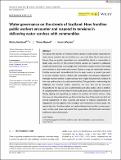Files in this item
Water governance on the streets of Scotland : how frontline public workers encounter and respond to tensions in delivering water services with communities
Item metadata
| dc.contributor.author | Holstead, Kirsty | |
| dc.contributor.author | Russell, Shona | |
| dc.contributor.author | Waylen, Kerry | |
| dc.date.accessioned | 2023-02-13T12:30:06Z | |
| dc.date.available | 2023-02-13T12:30:06Z | |
| dc.date.issued | 2023-02-06 | |
| dc.identifier | 278914153 | |
| dc.identifier | 57bf3680-87b7-44f9-8285-34f7f9007bfe | |
| dc.identifier | 000797136000001 | |
| dc.identifier | 85130257596 | |
| dc.identifier.citation | Holstead , K , Russell , S & Waylen , K 2023 , ' Water governance on the streets of Scotland : how frontline public workers encounter and respond to tensions in delivering water services with communities ' , Environmental Policy and Governance , vol. 33 , no. 1 , pp. 44-55 . https://doi.org/10.1002/eet.1995 | en |
| dc.identifier.issn | 1756-932X | |
| dc.identifier.other | ORCID: /0000-0002-3473-5019/work/113398967 | |
| dc.identifier.uri | https://hdl.handle.net/10023/26962 | |
| dc.description | Funding: This research was funded by the Scottish Government Hydro Nation Scholars Programme. | en |
| dc.description.abstract | We explore the activities of frontline workers situated in public bodies responsible for water service provision. We use Scotland as a case study. Here, like in other parts of Europe, communities there are greater expectations and responsibilities placed on communities to tackle water concerns. In this context, frontline workers are required to collaborate closely with communities to encourage their involvement in public services whilst being more attentive to their needs and concerns. Doing so brings the relationship between the frontline workers and communities into focus. In water services, a research gap exists as to how frontline workers interact with communities and influence engagement. Although frontline workers in water services have a highly influential role, evidence of how they perform their daily duties remains limited. This gap hinders understanding the challenges that frontline workers experience and how they can be overcome. Responding to this gap, we look to administration and policy studies, where a tradition of studying frontline workers exists in diverse public policy areas. Using the concepts of biasing, aligning and negotiating, we explore the activities of frontline workers. Using interview and observational data, we demonstrate how they (i) bias services to limit and control engagement, (ii) align resources and people to enhance opportunities for engagement and (iii) negotiate with colleagues and communities to deliver goals. We unpack the role of frontline workers and explore their pertinent position in water governance as they work inside and outside their organisations. We finish with conclusions and future avenues for research. | |
| dc.format.extent | 12 | |
| dc.format.extent | 1124861 | |
| dc.language.iso | eng | |
| dc.relation.ispartof | Environmental Policy and Governance | en |
| dc.subject | Community engagement | en |
| dc.subject | Frontline workers | en |
| dc.subject | State-citizen interactions | en |
| dc.subject | Water governance | en |
| dc.subject | Water services | en |
| dc.subject | HV Social pathology. Social and public welfare | en |
| dc.subject | RA0421 Public health. Hygiene. Preventive Medicine | en |
| dc.subject | TD Environmental technology. Sanitary engineering | en |
| dc.subject | T-NDAS | en |
| dc.subject | SDG 3 - Good Health and Well-being | en |
| dc.subject | MCC | en |
| dc.subject.lcc | HV | en |
| dc.subject.lcc | RA0421 | en |
| dc.subject.lcc | TD | en |
| dc.title | Water governance on the streets of Scotland : how frontline public workers encounter and respond to tensions in delivering water services with communities | en |
| dc.type | Journal article | en |
| dc.contributor.institution | University of St Andrews. School of Management | en |
| dc.contributor.institution | University of St Andrews. Centre for Energy Ethics | en |
| dc.contributor.institution | University of St Andrews. Centre for the Study of Philanthropy & Public Good | en |
| dc.contributor.institution | University of St Andrews. Centre for Social and Environmental Accounting Research | en |
| dc.identifier.doi | https://doi.org/10.1002/eet.1995 | |
| dc.description.status | Peer reviewed | en |
This item appears in the following Collection(s)
Items in the St Andrews Research Repository are protected by copyright, with all rights reserved, unless otherwise indicated.

